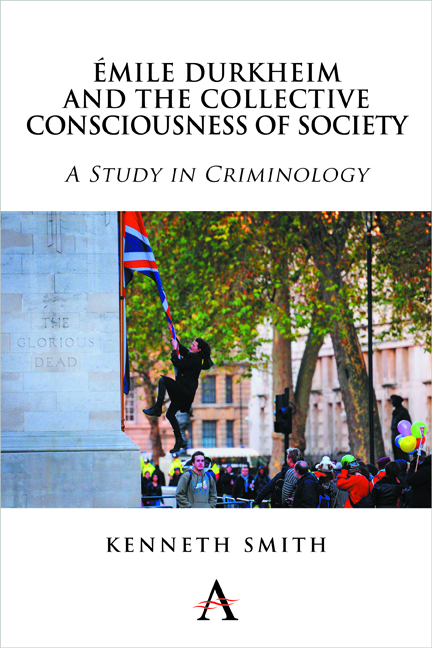Book contents
- Frontmatter
- Dedication
- Contents
- Epigraph
- Preface
- Introduction
- Part I The Concept of the Collective Consciousness of Society
- Part II The Form of the Collective Consciousness
- Part III Durkheim on Crime and Punishment
- Preface to Part III
- Introduction to Part III
- 8 Durkheim on Crime and Punishment in The Division of Labour in Society
- 9 Durkheim on Crime and Punishment in The Rules of Sociological Method
- 10 Interregnum on Suicide (1897)
- 11 Durkheim's Undeservedly Famous ‘Two Laws of Penal Evolution’ Essay (1901)
- 12 Durkheim on Crime and Punishment in Moral Education (1902-03)
- Conclusion to Part III
- Part IV Social Fact or Social Phenomenon? Durkheim's Concept of the Collective Consciousness as a ‘Social Fact’
- Part V Some Problems with Durkheim's Concept of the Common and Collective Consciousness
- Conclusion
- Appendix: On Paying a Debt to Society
- Notes
- References
- Index
12 - Durkheim on Crime and Punishment in Moral Education (1902-03)
from Part III - Durkheim on Crime and Punishment
Published online by Cambridge University Press: 05 October 2014
- Frontmatter
- Dedication
- Contents
- Epigraph
- Preface
- Introduction
- Part I The Concept of the Collective Consciousness of Society
- Part II The Form of the Collective Consciousness
- Part III Durkheim on Crime and Punishment
- Preface to Part III
- Introduction to Part III
- 8 Durkheim on Crime and Punishment in The Division of Labour in Society
- 9 Durkheim on Crime and Punishment in The Rules of Sociological Method
- 10 Interregnum on Suicide (1897)
- 11 Durkheim's Undeservedly Famous ‘Two Laws of Penal Evolution’ Essay (1901)
- 12 Durkheim on Crime and Punishment in Moral Education (1902-03)
- Conclusion to Part III
- Part IV Social Fact or Social Phenomenon? Durkheim's Concept of the Collective Consciousness as a ‘Social Fact’
- Part V Some Problems with Durkheim's Concept of the Common and Collective Consciousness
- Conclusion
- Appendix: On Paying a Debt to Society
- Notes
- References
- Index
Summary
All punishment, once applied, loses a part of its influence by the very fact of its application. What lends it authority, what makes it formidable, is not so much the misery that it causes as the moral discredit implied in the blame that it expresses. This feeling of moral sensitivity that stands guard against misdeeds is one of the most delicate of sentiments. It is not strong, it is not complete in itself, it lacks its full power of influence except among those for whom it has lost nothing of its original purity. We often say that the first offence always leads to others. This is because, once we have felt it, we are less sensitive to this shame. Punishment has this very great limitation of clashing with one of the chief resources of the moral life, and thus reducing its own efficacy in the future. It retains all of its force only when it simply constitutes a threat.
(Durkheim 2002, 198-9; emphasis added)Although Durkheim's general views on punishment have been widely discussed within contemporary criminology (Garland 1991, 23-81; Hudson 1998, 79-95; Cotterrell 1999, 65-99; Jones 2001, 142-51) much of this discussion seems to rely rather heavily on Durkheim's account of punishment in The Division of Labour, with perhaps some account of his ‘Two Laws of Penal Evolution’ essay for good measure, but with very little else besides.
- Type
- Chapter
- Information
- Émile Durkheim and the Collective Consciousness of Society , pp. 121 - 126Publisher: Anthem PressPrint publication year: 2014

